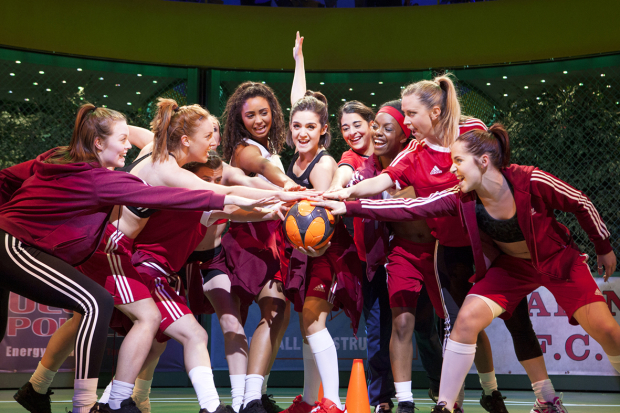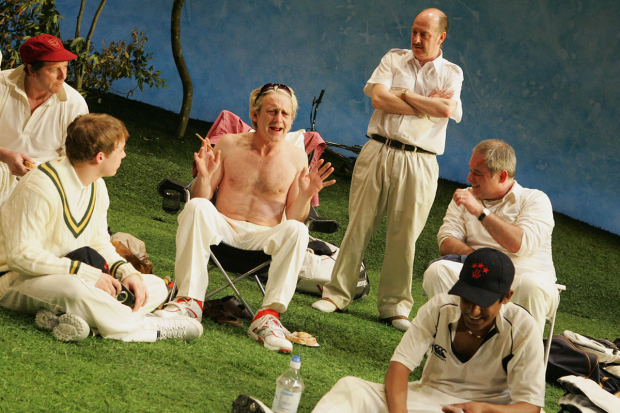Michael Coveney: Sport in the spotlight, from Patrick Marber to Bend It Like Beckham

© Ellie Kurtz
This Sporting Life was a great movie about rugby league in the north of England (starring Richard Harris) written by novelist and playwright David Storey, directed by Lindsay Anderson. Manchester United's home ground Old Trafford was christened the theatre of dreams by one of the club's greatest stars, Bobby Charlton.
Charlton was a boyhood idol of mine – still is, in a way – and the idea of a sporting stadium as a theatre came rushing back to me last Monday at Lord's cricket ground, where an almost unprecedented last-day crowd of 20,000 people roared England to victory over New Zealand at the end of a thrilling five-day contest. No-one who was there – me and my better half included – will ever forget it.
This was true theatre. But so was Out of Joint's rugger play Crouch, Touch, Pause, Engage which tells the story of former Welsh captain Gareth Thomas coming out as gay while leading his country to glory in the context of personal anguish and a dispirited community in his home town of Bridgend. David Storey's The Changing Room, directed by Anderson at the Royal Court, is an earlier play of "backstage politics and aspiration" in a rugby locker room.
So, is sport more theatrical than theatre? Maybe. Sometimes. Football moves centre stage next month when Patrick Marber's The Red Lion opens at the National and Howard Goodall and Charles Hart's Bend it Like Beckham arrives in the West End. Both, in different ways, return the audience to an understanding of the root joy and pleasure in a game that for many is now tainted with too much money and corruption and the spoilt, over-indulged prima donnas of the Premier League.
The Red Lion is set in the twilight world of small-time, semi-professional football, a world Marber knows well as he was involved in the re-launch of the tiny Sussex club, Lewes FC. And Bend It Like Beckham, presumably modelled on the film starring Keira Knightley, analyses the culture split as an Asian girl from an orthodox Sikh family tests her background against her instinct by running away with a youth touring side to Germany.
The beautiful game – and it can be just that, except perhaps when played by the English national team – was also celebrated in a climate of factionalism and teenage unrest in an earlier musical by Andrew Lloyd Webber and Ben Elton called The Beautiful Game, based on the true story of a cross-sectarian boys' football team in Belfast during the recent Troubles, its best song, "Our Kind of Love" cut and pasted into the Phantom sequel Love Never Dies.
The most prolific source of sporting movies and plays is boxing, with its inbuilt certainties of the underdog rising from the ghetto – the hero's usually black American male; though two fairly recent movies, Girlfight and Million Dollar Baby, both terrific, did a Bend it Like Beckham in focussing on female pugilists – to make a name, and a fortune, and then lose it. Earlier this year, the Bush hit the jackpot with The Royale, an expressionist treatment of the story of American heavyweight champ Jack Johnson, also the subject of Howard Sackler's late 1960s The Great White Hope, a brilliant play and then movie.
Roy Williams chipped in recently, too, with his award-winning boxing play Sucker Punch. The boxing play always has the visceral excitement of the ring itself going for it, the Homeric contest between champ and underdog, the vivacity of a predictable support cast of trainers, managers, promoters and wide boys.
And in other sports, such as athletics, these elements can be extended into realms of existentialism and social commentary, as in another great 1960s movie, The Loneliness of the Long Distance Runner (starring Tom Courtenay), and Chariots of Fire.
The latter was one of the best adaptations (by Mike Bartlett) of a movie for the stage, inventing both a new social comedy and the visceral excitement of the racing track in a circular staging similar to a pre-diesel Starlight Express without roller skates. Cricket plays are rarer, even though half the theatre world is nuts about the sport.

© Headlong
Damian Lewis was spotted at Lord's over the weekend by one of the Test Match Special radio commentators, and there was speculation in the commentary box as to the provenance of his droopy Zapata moustache. Jonathan Agnew, the BBC cricket correspondent, hoped out loud that the thing wasn't a matter of personal choice but acquired for a performance, though no-one was on hand to mention American Buffalo.
Before play started on Monday I bumped into my publisher friend Richard Johnson who used to be a star fast bowler for Harold Pinter's Gaieties side. Pinter wasn't much of a batsman, but when he uncharacteristically belted a glorious short innings one sunny afternoon, Richard complimented him in the bar afterwards: "Harold, that was sheer Compton!" The great playwright leaned into his face with an angry, corrective gesture. "Hutton!"
In the Compton stand, we found Time Out editor Caroline McGinn and her family, and made lots of other new casual friends. That's what happens at cricket matches. The new star Ben Stokes was our hero, every ball of the game cheered and ooh-aaghed from 11am to 6pm.
Theatre can only dream of this special relationship between players and audience. One writer in The Times this week even went so far as to say that terrorism had no chance of success for as long as 20,000 people of mixed background and ethnicity actively witnessed great cricket matches at Lord's. I think he's right. Can theatre possibly do the same? Can theatre change the world? I'm not sure.










